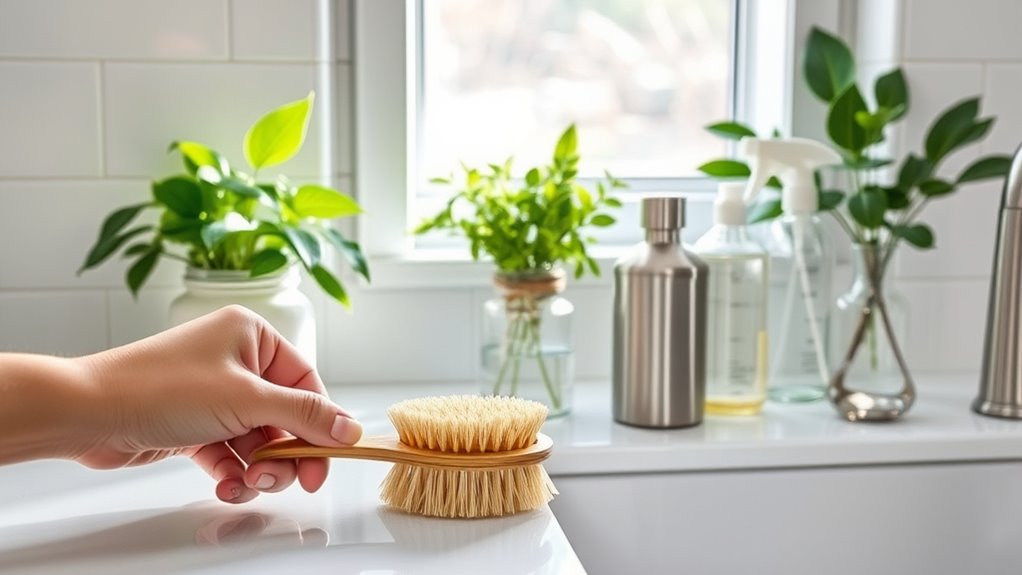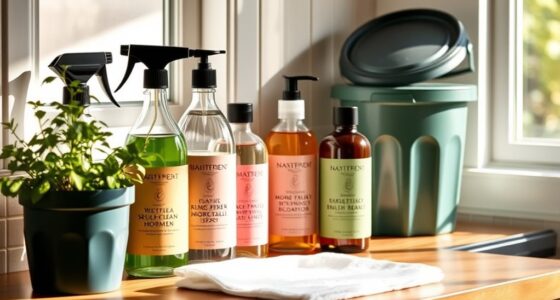To reduce waste while you clean, switch disposable items like paper towels for reusable cloths or microfiber towels that last longer. Use eco-friendly, biodegradable detergents in refillable bottles to cut down on packaging waste. Incorporate durable tools made from sustainable materials like bamboo or recycled plastics, which can be maintained and used for years. Small routine adjustments, like keeping reusable tools handy, can make a big difference for the environment. Keep going to discover more tips for eco-friendly cleaning.
Key Takeaways
- Use reusable cleaning tools like cloths, microfiber towels, and scrub brushes made from sustainable materials.
- Choose eco-friendly, biodegradable detergents in refillable bottles to minimize packaging waste.
- Incorporate routine adjustments by replacing disposable supplies with durable, washable items.
- Maintain tools and surfaces regularly to extend their lifespan and reduce replacement waste.
- Opt for natural, chemical-free cleaning products to improve indoor air quality and support health.

Zero-waste cleaning is a sustainable approach that helps you reduce environmental impact while maintaining a clean home. Instead of relying on disposable products and harmful chemicals, you can make simple switches that considerably cut down waste and pollution. One of the most effective ways to achieve this is by using reusable cleaning tools. Swap out single-use paper towels for washable cloths or microfiber towels that can be used repeatedly. Not only do they generate less waste, but they also often clean more effectively. You might also consider investing in reusable scrub brushes, mop pads, and dusters. These durable items last for years, saving you money and reducing the clutter of disposable alternatives. When choosing your tools, look for options made from sustainable materials such as bamboo, metal, or recycled plastics. This way, your cleaning routine supports eco-friendly practices even beyond waste reduction.
Alongside reusable tools, switching to eco friendly detergents is another important step. Conventional cleaning products often contain harsh chemicals that harm the environment and can be harmful to your health. Eco friendly detergents are formulated with natural, biodegradable ingredients that break down quickly and don’t pollute waterways. They come in concentrated forms or refillable bottles, which further minimizes packaging waste. You’ll find many brands now offer plant-based cleaners that are just as effective as traditional options but much gentler on the planet. When shopping for detergents, read labels carefully to ensure they’re truly eco-friendly, avoiding those with synthetic fragrances or phosphates. Using these safer alternatives reduces your chemical footprint and supports a healthier environment.
Incorporating reusable cleaning tools and eco friendly detergents into your routine doesn’t require major overhauls. Start by replacing your disposable cleaning supplies with durable, reusable items. Keep a stash of washable cloths and refillable bottles handy in your cleaning closet. When you need to clean surfaces, use your reusable tools and eco-friendly detergents to get the job done. Over time, you’ll notice a decrease in waste and a positive impact on the planet. Additionally, these choices often lead to better indoor air quality, since you’re avoiding airborne chemicals found in many conventional cleaners. Making these small yet intentional adjustments empowers you to maintain a spotless home while being kinder to the environment. With consistent effort, zero-waste cleaning can become a seamless part of your lifestyle, proving that sustainability and cleanliness go hand in hand. Regular maintenance and canvas waterproofing can further prolong the life of your cleaning tools and surfaces, reducing the need for replacements and waste.
Frequently Asked Questions
Are Zero-Waste Cleaning Products as Effective as Conventional Ones?
You might wonder if zero-waste cleaning products work as well as conventional ones. Generally, they’re just as effective because they focus on eco-friendly packaging and natural ingredients. Plus, many are designed for product longevity, so you don’t need to buy new supplies constantly. With proper use, zero-waste options clean just as thoroughly, helping you reduce waste while maintaining a spotless home.
How Can I Transition My Family to Zero-Waste Cleaning Routines?
To shift your family to zero-waste cleaning routines, involve everyone from the start. Explain the benefits of sustainable habits and how they help the environment. Encourage family members to participate in choosing eco-friendly products and making homemade cleaners. Make it fun and set small, achievable goals. Over time, these habits become second nature, creating a more sustainable home and fostering a collective commitment to waste reduction.
What Are the Best DIY Recipes for Zero-Waste Cleaning Solutions?
When searching for homemade disinfectants, you can mix vinegar, baking soda, and essential oils for an effective, eco-friendly solution. For an eco-friendly scrubber, make reusable scrub pads from old cloth or natural fibers. These DIY recipes help you reduce waste and avoid harsh chemicals, making your cleaning routine sustainable. You’ll find that simple ingredients and reusable tools make a big difference in your zero-waste cleaning efforts.
How Do Zero-Waste Cleaning Methods Impact Indoor Air Quality?
Imagine breathing cleaner air every day. Zero-waste cleaning methods substantially improve indoor air quality by reducing indoor air contaminants and VOC emissions from harsh cleaners. When you choose eco-friendly, natural solutions, you minimize the release of harmful chemicals, helping you breathe easier and create a healthier environment. This gentle approach lowers exposure to pollutants, making your space safer and more comfortable for everyone.
Where Can I Find Affordable Zero-Waste Cleaning Supplies Locally?
To find affordable zero-waste cleaning supplies locally, check out bulk stores and local markets. These places often sell eco-friendly cleaning products in reusable containers, helping you reduce waste and save money. Look for stores that focus on sustainable products, and don’t hesitate to ask staff for recommendations. Shopping at these local spots makes it easy to stick to your zero-waste goals while staying within your budget.
Conclusion
So, after all this, it’s funny how the simplest switch—like ditching plastic bottles or choosing reusable cloths—can make a huge difference. You’d think that saving the planet would require some grand effort, but nope, just a little mindful cleaning. Irony? It’s easier to go zero-waste than to keep ignoring the impact of your everyday habits. So, go ahead, clean up your act—literally—and prove that small changes really do matter.










